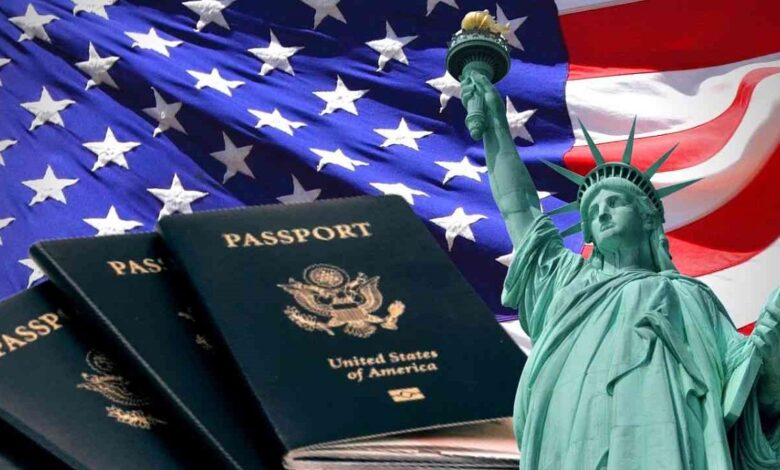Who is eligible for the diversity visa lottery?

Do you dream of living and working in the United States? Are you looking for an opportunity to start a new life in a diverse and vibrant country? Well, look no further than the Diversity Visa Lottery! This unique program offers individuals from eligible countries the chance to win a green card and become permanent residents of the US. But who exactly is eligible for this incredible opportunity? In this article, we will explore the criteria for participation in the diversity visa lottery and shed light on how you can make your American dreams come true.
What is the Diversity Visa Lottery?
The Diversity Visa Lottery, also known as the DV lottery or Green Card lottery. It is a program administered by the United States government that aims to increase diversity in its immigrant population. The lottery provides an opportunity for individuals from countries with historically low immigration rates to the United States to apply for a chance to obtain permanent residency. Each year, a limited number of visas are made available through this lottery system.
What makes the Diversity Visa Lottery unique is its emphasis on promoting diversity among immigrants. Rather than prioritizing family ties or employment opportunities. This lottery levels the playing field and gives individuals from underrepresented countries an equal shot at obtaining a Green Card. This not only allows for greater cultural exchange within the United States but also enriches American society with new perspectives and experiences.
However, it’s important to note that participation in the Diversity Visa Lottery does not guarantee entry into the United States. If selected as a winner, applicants must still meet all eligibility requirements and undergo thorough background checks before being granted permanent residency. While some may argue that this program provides an easy path to immigration. It plays a vital role in fostering diversity and inclusivity within American society while offering hope to those dreaming of pursuing new opportunities in the Land of Liberty.
Eligibility Requirements: Who can apply?
The eligibility requirements for the Diversity Visa Lottery program are quite simple and straightforward. To be eligible to apply, individuals must come from a country that has historically low immigration rates to the United States. Each year, a list is published by the U.S. Department of State, outlining which countries do not meet this criterion. It’s important to note that being born in an ineligible country does not necessarily disqualify someone from applying – if either of their parents were born in an eligible country or transferred their own eligibility to them through marriage, they can still participate.
Additionally, applicants must have at least a high school education or its equivalent. As determined by educational credential evaluators approved by the U.S. government. Alternatively, individuals who do not meet this education requirement but possess significant work experience within specific fields may still be considered eligible. This provision recognizes that skills and expertise gained through years of work can also contribute positively to the diversity visa lottery program.
It’s essential to understand these eligibility requirements thoroughly before deciding whether to apply for the diversity visa lottery program. While it offers a chance at obtaining permanent residency status in the United States for individuals from historically underrepresented countries. It also demands strict adherence to all regulations and guidelines set forth by the U.S. government – ensuring fairness and balanced representation for all participants across numerous backgrounds and qualifications.
Country of Chargeability: What does it mean?
Country of chargeability is an important factor in determining eligibility for the Diversity Visa Lottery. But what exactly does it mean? Simply put, it refers to the country from which an applicant claims nationality or citizenship. Each year, the United States establishes a list of eligible countries whose residents can participate in the lottery. This list is updated annually and includes countries with low immigration rates to the US.
One interesting aspect of country of chargeability is that it’s not necessarily tied to an individual’s current residence or place of birth. For example, someone born in India but living in Canada may still be considered chargeable to India if they claim Indian nationality or citizenship. This means that individuals can have multiple options when it comes to choosing their country of chargeability.
While being eligible under one’s chosen country of chargeability increases one’s chances of winning the DV lottery. There are limitations set by law on how many visas each country can receive. This means that even if an applicant meets all other requirements and wins the lottery. They may not be able to obtain a visa if their country has exhausted its quota.
It is important to note that participating in the Diversity Visa Lottery does not guarantee success. The number of applicants far exceeds the available visas, making it a highly competitive process. However, by carefully selecting your country of chargeability and understanding the eligibility requirements. You can increase your chances of being selected.
Education or Work Experience: What are the qualifications?
When it comes to the eligibility for the diversity visa lottery, both education and work experience play crucial roles. However, the qualifications required are not black and white; they vary depending on what category an applicant falls into. For those with higher levels of education, a bachelor’s degree or equivalent is generally expected. This requirement can be met through completion of a university program that lasted at least four years, or by acquiring a diploma from a professional school after completing three years of study.
On the other hand, work experience can also be considered as an alternative qualification for those who do not have a bachelor’s degree but possess significant job experience in specific occupations. The U.S. Department of Labor has established a list known as the Occupational Information Network (O×NET). Which categorizes occupations by their respective job zones – ranging from 1 (little to no preparation needed) to 5 (extensive preparation required). To qualify through work experience, applicants must have at least two years of training or work experience in an occupation classified under job zone 4 or 5.
What makes these qualifications interesting is that they highlight different approaches to measuring human potential. One focused on formal education and another on practical skills gained through work experience. While traditional educational paths are often seen as necessary indicators of success. Placing importance on real-world know-how acknowledges the value practical knowledge brings to productivity and innovation within various professions. By offering applicants multiple avenues for eligibility based on either education or work experience. The diversity visa lottery encourages a diverse pool of applicants with a wide range of skills and backgrounds. This diversity can lead to a more vibrant and inclusive society. As individuals from different walks of life bring unique perspectives and ideas to the table.
Ineligible Countries: Who cannot participate?
In the diverse melting pot that is the United States. It may come as a surprise that there are some countries whose citizens are not eligible to participate in the annual Diversity Visa Lottery. These ineligible countries are determined based on two factors:
1) The massive number of immigrants from a particular country who have already arrived in the US within the last five years.
2) Whether the country is recognized as a state sponsor of terrorism by the US government. This restriction aims to maintain diversity among immigrant populations and address national security concerns.
Currently, there are seven countries listed as ineligible for participation in the Diversity Visa Lottery: Bangladesh, Brazil, Canada, China (mainland-born), Colombia, Dominican Republic, El Salvador, Guatemala, Haiti, India, Jamaica, Mexico, Nigeria, Pakistan. While these restrictions may be disappointing for citizens from these nations hoping for an opportunity to secure. Their place in America’s cultural mosaic through this lottery system. It is important to acknowledge that immigration avenues beyond this particular program still exist.
One alternative route to consider is obtaining a work visa. The United States offers several types of work visas, such as H-1B for skilled workers, L-1 for intra-company transfers. And O-1 for individuals with extraordinary abilities in their field. These visas require sponsorship from a U.S.-based employer and have specific requirements that applicants must meet.
Conclusion:
In conclusion, understanding the diversity visa lottery process is crucial for anyone aspiring to pursue their American dream through this avenue. It is not just a random lottery where luck plays a significant role. It is a carefully designed program that aims to diversify the immigrant population in the United States. By promoting diversity and ensuring equal opportunities for individuals from countries with historically low rates of immigration. The diversity visa lottery contributes to creating a more multicultural and vibrant society.




